
GlobalData: Bird Flu Concerns Pose Challenges for Meat and Producers to Keep Consumer Trust Intact
CRSB Launches Certification Recognition Credit for Another Year
FCC: Moderate Sales but Improved Margins for Canadian Food and Beverage Manufacturers in 2024
New U.S. Meat Labelling Rules Causing Concern
CMC Urges Support for Temporary Foreign Workers to Reinforce Canada’s Meat Industry
Navigating the Impact of Bill C-58
meatbusinesspro.com $7.99 THE BEEF, PORK & POULTRY INDUSTRY DIGITAL MAGAZINE April 2024
ANNUAL POWER OF MEAT REPORTS STRONG MEAT CONSUMPTION, EVOLVING
19TH

2 MEATBUSINESSPRO April 2024 meatbusinesspro.com https://www.yesgroup.ca
April 2024

Harvey's Celebrates 65 Years of Your Burger, Your Way
5 6 10 12 14 16 20 22
19th Annual Power of Meat Reports Strong Meat Consumption, Evolving Consumer Trends
GlobalData: Bird Flu Concerns Pose Challenges for Meat and Producers to Keep Consumer Trust Intact
CRSB Launches
Certification Recognition Credit for Another Year
FCC: Moderate Sales but Improved Margins for Canadian Food and Beverage Manufacturers in 2024
New U.S. Meat Labelling Rules Causing Concern
CMC Urges Support for Temporary Foreign Workers to Reinforce Canada’s Meat Industry
Navigating the Impact of Bill C-58

https://www.yesgroup.ca
THE BEEF, PORK & POULTRY INDUSTRY DIGITAL MAGAZINE
April 2024 Volume 25 Number 4
PUBLISHER
Ray Blumenfeld ray@meatbusiness.ca
MANAGING EDITOR
Scott Taylor publishing@meatbusiness.ca
DIGITAL MEDIA EDITOR
Cam Patterson cam@meatbusiness.ca
CONTRIBUTING WRITERS
Alex Oulton, Jack Roberts,
CREATIVE DIRECTOR
Patrick Cairns
Meat Business Pro is published
12 times a year by We Communications West Inc


HARVEY'S CELEBRATES 65 YEARS OF YOUR BURGER, YOUR WAY
Harvey's is celebrating 65 years of customized burgers with the launch of the Harvey's Burger Hunt. Starting on April 1st, the burger brand will hide 1,650 free burger cards near Harvey's locations and iconic landmarks across the country, including four VIP Cards that will give the lucky winners free 'Harvey's for a year'.
The chain is also kicking off a $1.65 Original Burger offer, available through the Harvey's app for a limited time.
"Harvey's is honoured to be celebrating 65 years of creating customized burgers just the way Canadians like them," says Michael Nault, COO of Harvey's Canada. "Delivering a personalized approach to every meal continues to be what drives us forward and we are excited to invite our guests to help us mark the occasion in a variety of fun and engaging ways."
CO MMUNICATIONS W EST IN C
We Communications West Inc.
106-530 Kenaston Boulevard
Winnipeg, MB, Canada R3N 1Z4
Phone: 204.985.9502 Fax: 204.582.9800 Toll Free: 1.800.344.7055
E-mail: publishing@meatbusiness.ca Website: www.meatbusinesspro.com
Meat Business Pro subscriptions are available for $28.00/year or $46.00/two years and includes the annual Buyers Guide issue.
©2020 We Communications West Inc. All rights reserved.
The contents of this publication may not be reproduced by any means in whole or in part, without prior written consent from the publisher. Printed in Canada. ISSN 1715-6726
To add to the celebrations, Harvey's will release limited edition merchandise and made-to-order t-shirts where Canadians can have their own name printed between the brand's iconic bun logo. Five dollars from each item sold will go to Tree Canada in support of their collective goal of planting 250,000 trees by 2026.
"Harvey's has been a staple of quality food and great memories for many generations," says Nault. "It's important to us that our guests who have supported us for 65 years, and our future guests, feel part of our celebrations and continue to enjoy making their burger a beautiful thing for years to come."
Harvey's was founded in 1959 by Montrealer Richard Mauran, whose vision for a made-to-order, charcoal-broiled hamburger, topped the way you like it, was a novel idea among Canadian quick-service restaurants. Nearly 300 locations later and this vision is still 20/20, offering quality, made-to-order food and millions of topping combinations. Along the way, it has expanded its menu with new options to customize, including chicken sandwiches, poutine and its famous Angus burgers.


5 meatbusinesspro.com April 2024 MEATBUSINESSPRO
Cam Patterson


19TH ANNUAL POWER OF MEAT REPORTS STRONG MEAT CONSUMPTION, EVOLVING CONSUMER TRENDS
The number of Americans who describe themselves as meat eaters (80%) and the number of households that purchase meat (98%) remain steady from 2023, while the number seeking to decrease meat consumption has fallen by 20% since 2020, according to the 19th annual Power of Meat report released by the Meat Institute and The Food Industry Association (FMI).

Overall household penetration averages above 97% for all incomes, ethnicities, household sizes and ages. Generation X (the smallest of the generations) accounts for the greatest proportion of sales (32%), while Boomers buy meat most frequently (53 times per year), and Millennials spend the most money per meat purchase (nearly $17).
Economic conditions continue to impact Americans’ shopping and meal choices, with 43% of Americans cutting back on restaurant meals. Of meat eaters who are buying restaurant meals less often, 75% try to recreate restaurant-type meals at home.

Rick Stein, FMI’s Vice President of Fresh Foods, stated, “As price conscious shoppers look for ways to continue enjoying their favorite proteins, they are cooking more at home and including meat in everything from new recipes found online to their favorite comfort meals and holiday feasts. With shoppers including meat in nearly 87% of home-cooked meals every week and looking to meat to make occasions special, the opportunities to provide great choice, taste, and value continue to grow.”
At the grocery store, 73% of Americans are making one or more changes to meat purchases to save moneywith the most common strategy being to adjust the quantity of meat purchased. Among meat purchasers changing quantities to save money, 30% buy smaller packages to save money immediately, and 42% buy larger bulk packs to save money over time. On the other hand, more than nine in 10 shoppers say they would spend extra on occasion, with holidays, special celebrations and entertaining the top reasons.
6 MEATBUSINESSPRO April 2024 meatbusinesspro.com
“When shoppers hear ‘protein,’ they think ‘meat,’ and the Meat Institute is actively working to maintain and grow Americans’ confidence about meat’s role in healthy, balanced diets, “said Meat Institute President and CEO Julie Anna Potts. “Our Protein PACT initiative drives progress and provides transparent information about how meat contributes to the health of people, animals, and the planet - which 83% of consumers are looking for when they make meat purchases.”

NSF INTERNATIONAL FOCUSES ON CANADIAN FOOD INDUSTRY WITH NEW WEBSITE FOR SERVICES IN CANADA
Global public health organization showcases services for Canada’s growing and fast-changing
THE POWER OF MEAT 2024
complexities associated with a globalized food supply network present challenges for NSF International clients in Canada and around the world. The new Canadian website offers expertise and services to help companies navigate these challenges, including certification and auditing, consulting, technical services, training and education, food and label compliance, packaging, and product and process development.
• Inflationary pressure felt by consumers led to a subdued year for the meat department. With $99 billion in sales, 98.2% household penetration and 48 purchases per year, meat is the biggest revenue generator among the fresh departments. However, dollar sales were flat (0.1%) and pound (-1.0%) sales decreased year-on-year (Circana MULO+).
NSF International’s Canadian website provides information on the following services:
Certification & auditing: Third-party food safety audits and certifications, which are integral components of supplier selection and regulatory compliance. Accurate audits are the first step toward successful verification of a company’s food safety system, providing improved brand protection and customer confidence. Certifications and audits are available for animal and produce in the agriculture industry, GFSI certification and management system registration.
• A clear value proposition can help attract the 30% of shoppers who account for 66% of dollar sales. Traditional grocery’s share of meat sales dropped from 42.8% in 2019 to 39.7% in 2023 (Circana, Panel, All outlets) — a shift of several billion dollars. Driven by strong millennial engagement, supercenters have gained 2.2 share points since 2019. The shares for club stores and e-commerce grew over the past five years but plateaued in 2023.
Consulting: A full-service team approach providing technical resources, expertise and insight for a wide range of food safety and quality services. NSF International provides finished product inspection testing for food, packaging and non-food testing for rapid analysis and insight to protect the brand, technical support services from on-site temporary or permanent technical staffing placements, and various types of consulting.
Technical services: A one-stop solution for food product compliance and formulation, from concept to finished product, including food and label compliance, packaging, product and process development, and shelf-life and product evaluation.
• Shoppers bought meat less frequently and bought less per purchase — the root causes of the volume pressure. The impact of price combined with longerterm demographic shifts point to an opportunity to re-align assortment, marketing and merchandising with changing purchase patterns. With shopper case-ready acceptance reaching a record high, consider pack size variety, freezer-ready packaging, secondary displays and cross-merchandising to optimize trips and units per trip.
Training and education: Training for the global food and beverage industry across the supply chain as an
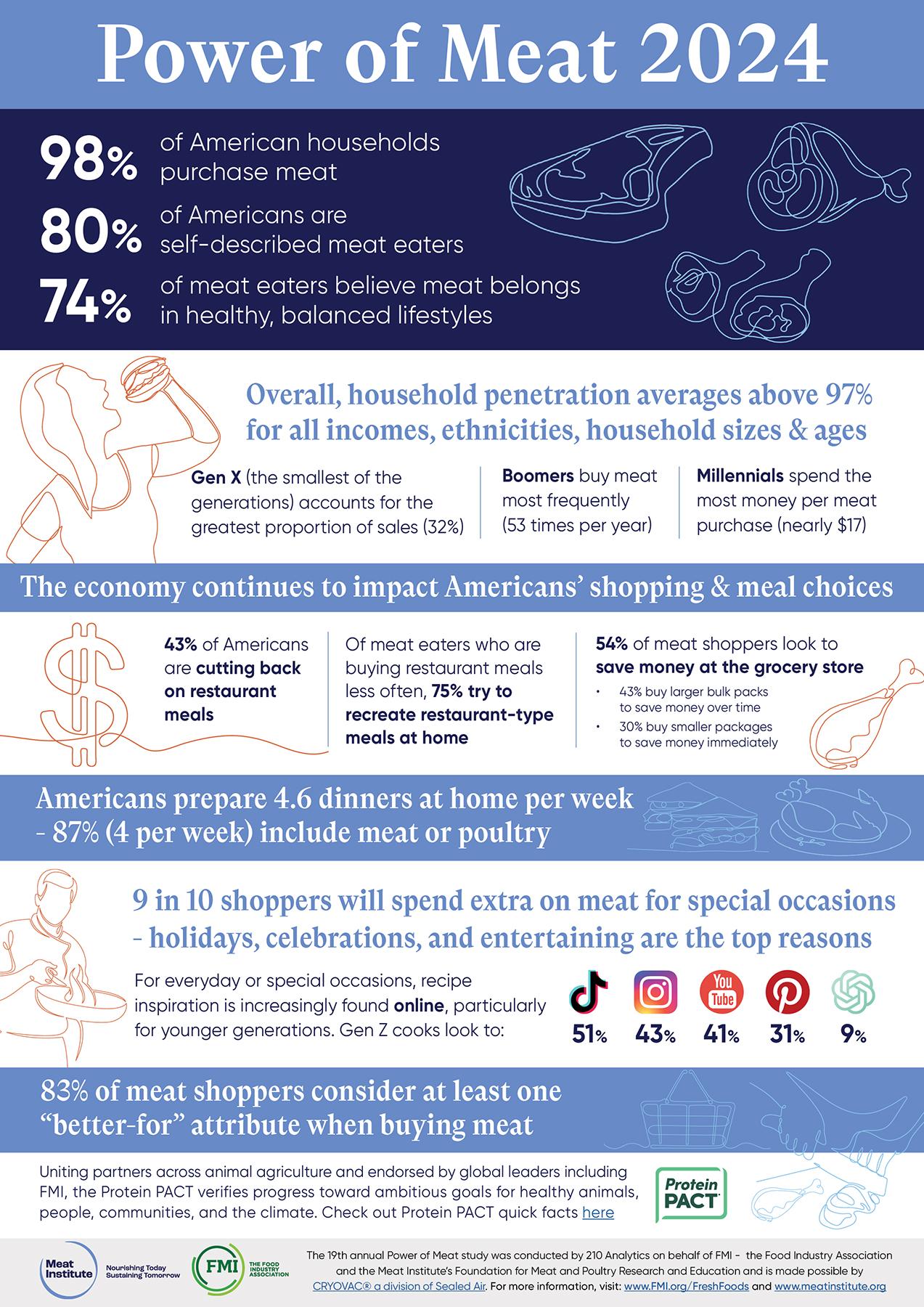
Education and Training (IACET) site. Topics include HACCP, regulations (including FSMA), food science, food packaging, include eLearning, on-site, customized and open enrolment.
management system registrations for the food, automotive,
safety services capabilities video, find a list of Canadian food experts, learn about upcoming events and global news releases, submit a question or read an FAQ.
Continued on page 8











7 meatbusinesspro.com April 2024 MEATBUSINESSPRO
September/October 2017 CANADIAN MEAT BUSINESS 23 meatbusiness.ca
https://www.yesgroup.ca
• Shopping for meat/poultry is a balancing act between money, time, nutrition, taste and meal occasion. Meat department prices rose 2.1% in 2023, below the rate of total food and beverage inflation (+5.9%) (Circana, MULO+). Yet, the sustained impact of several years of inflation caused shoppers to buy what is on sales and adapt what amount (54%), kind (45%), cut (43%) and brand (40%) of meat and poultry they purchased.
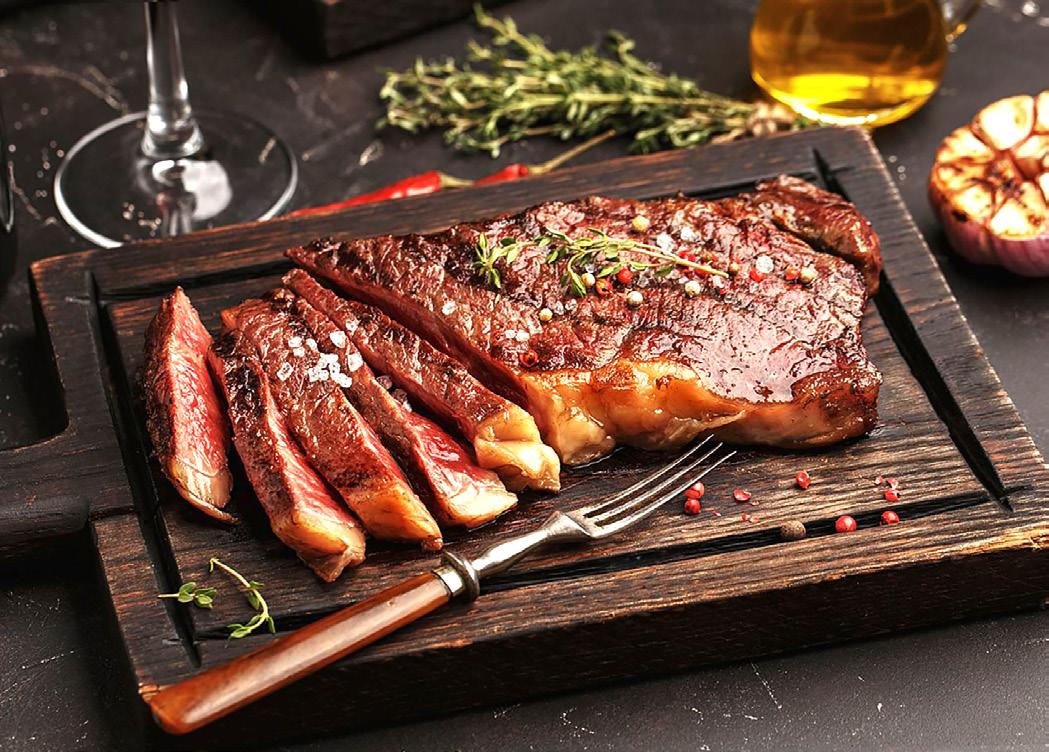
• 91% of consumers can be persuaded to spend a little more on meat and poultry. Holidays, special occasions and entertaining are the top reasons to spend a little more — emphasizing the need to optimize sales during primary and secondary holidays while recognizing traditions are changing. A cut or kind of meat/poultry consumers deem healthier, a preferred pack size or brand, and convenience can also prompt them to splurge a little.
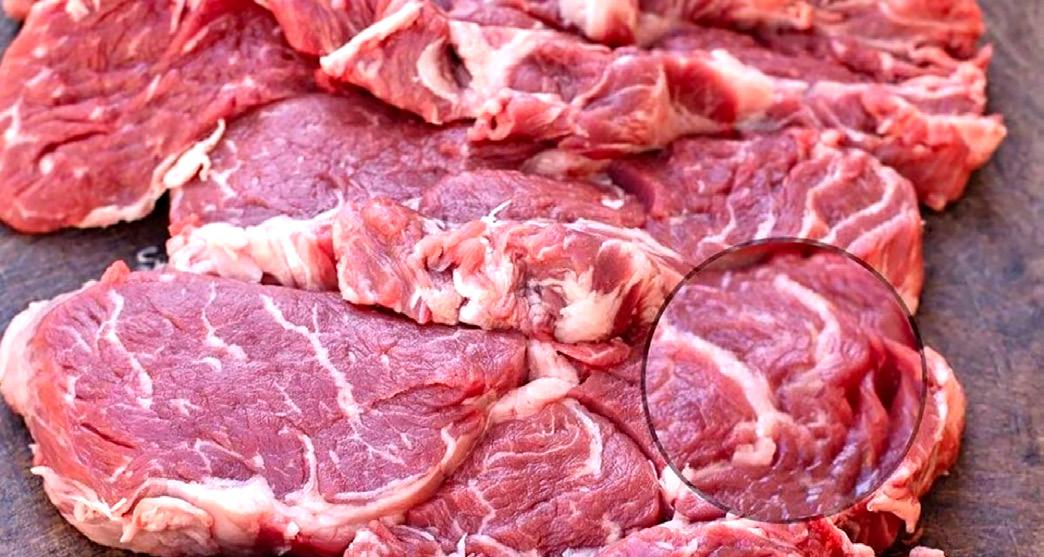
• Seven in 10 consumers believe meat is an overall healthy choice that provides fuel and essential nutrients. While the majority of consumers believe meat and poultry belong in the diet, they are interested in portion size variety and suggestions for nutritious choices without sacrificing taste or paying more. Compared to 2008, “protein” is a more desirable package callout while fewer consumers focus on fat, sodium, cholesterol and saturated fat when buying meat/poultry.

• A thoughtful approach to meat purchases drives interest in transparency. Consumers look to brands and grocery stores to provide insight into the who, what, how and where of the meat/poultry they purchase. More than one-third of consumers look for better-for… options addressing the planet (38%), people (36%) and animal welfare (34%). Up from 43% in 2020, 55% of consumers feel good about animal welfare practices in the U.S.
• Convenience is important but taking a backseat to price as consumers balance their spending. Meat and poultry are part of 87% of home-prepared meals that reflect a mix of scratch-cooked and semi-and fullyprepared items. While most consumers spend less than 30 minutes on preparing dinner, they purchased valueadded that is typically sold at a price premium less often. This resulted in value-added meat and poultry sales being down across most proteins in 2023 for the first time in years.

• Meal inspiration sources vary widely, with digital resources and technology making rapid inroads. Gen Z draws meal inspiration from TikTok, YouTube and Instagram, whereas Boomers rely on routine meals, family/friends and recipe websites. This shows the importance of providing meal inspiration across platforms and closing the gap between inspiration and purchase.
8 MEATBUSINESSPRO April 2024 meatbusinesspro.com

• Price and promotions have a big impact in today’s marketplace, but taste drives the all-important second purchase. Help shoppers create meals they want to make again: 92% of shoppers agree the meat/poultry can be a great price, but if it did not taste good, they will not buy it again. Emphasize quality and taste and provide relevant tips by preferred cooking appliances. Air fryers are now the number three appliance in preparing meat and poultry, behind the stove and oven.


https://www.dhenryandsons.com

9 meatbusinesspro.com April 2024 MEATBUSINESSPRO VEMAG REPLACEMENT PARTS


GLOBALDATA: BIRD FLU CONCERNS POSE CHALLENGES FOR MEAT AND PRODUCERS TO KEEP CONSUMER TRUST INTACT
Health authorities have reassured consumers that the spread of bird flu to dairy cows in several U.S. states poses a low risk to human health. However, this has not stopped the story from dominating news headlines and potentially drawing attention to the link between intensive animal farming and disease transmission. As consumers increasingly reassess the role of animalbased products in their diet, manufacturers are faced with both opportunities and challenges to gaining consumer trust, says GlobalData, a leading data and analytics company.
The US Department of Agriculture (USDA), the Food and Drug Administration (FDA) and the Centers for Disease Control and Prevention (CDC) confirmed the spread of bird flu in sick cattle from dairy farms in Kansas and Texas. Subsequently, a person in Texas was diagnosed with a highly virulent strain of bird flu, representing only the second human case of this strain of bird flu ever detected in the U.S. The CDC emphasized that the public has a low risk of catching the virus, which can spread through close contact with infected birds. Moreover, the USDA did not expect the bird flu cases in cattle to affect food safety or supply in the U.S., given that pasteurization kills off bacteria and viruses, including this strain of bird flu.
Katrina Diamonon, Principal Analyst at GlobalData, comments: “Despite assurances from health authorities, it will be difficult for consumers to detach this concerning news story from their own experiences. Many will inevitably be worried about how the spread of this virus may affect the safety of the meat and dairy products they consume.
“There is also residual anxiety and fear following the unprecedented and devastating impacts of the COVID-19 pandemic. Even though there is no definitive proof of how the pandemic started, one prominent theory is that the virus emerged in wild animals and spread to humans at the market. This has naturally served to raise suspicion about the meat supply chain and cause consumers to rethink their choices.”
A survey conducted by GlobalData found that over onequarter (27%) of consumers globally would consume plant-based meat or dairy alternatives for safety reasons, underscoring the perceived risks that some consumers associate with traditional animal-based products.
Consumers are becoming increasingly aware that industrial agriculture can have significant implications for food safety due to various factors inherent in large-scale, intensive animal production systems. For example, factory farming often involves high-density confinement of animals, which can facilitate the spread of pathogens, while crowded and unsanitary conditions increase the likelihood of disease transmission, leading to higher levels of contamination in animal products.
Diamonon concludes: “It is crucial to establish consumer confidence in products through clear labeling, certifications, and seals, as well as traceability and supply chain information. No brand is immune from food safety scares, but proactive reassurances from brands can help regain consumer trust.”FCC is a stable partner that reinvests profits back into the industry and communities it serves. For more information, visit fcc.
10 MEATBUSINESSPRO April 2024 meatbusinesspro.com

https://www.beaconmetals.com

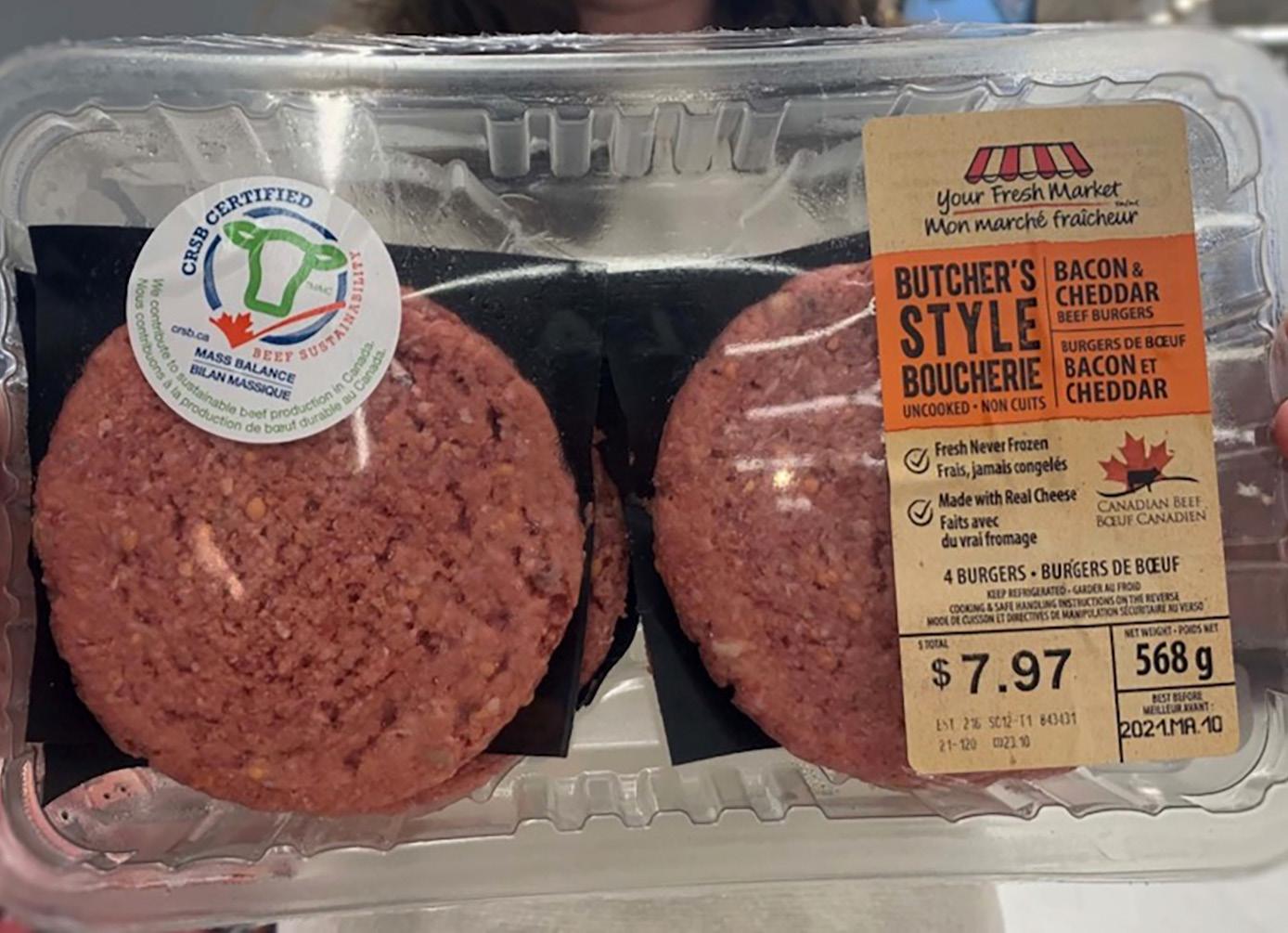
CRSB LAUNCHES CERTIFICATION RECOGNITION CREDIT FOR ANOTHER YEAR
The Canadian Roundtable for Sustainable Beef (CRSB) has once again partnered with Cargill and its customers – Centennial Food Solutions, Gordon Food Service, Intercity Packers, MacGregors Meat & Seafood, McDonald’s Canada, Metro, Recipe Unlimited and Walmart – to provide up to $400 CAD for beef producers maintaining their CRSB Certification. This credit will be provided for another year to “fill the gap” for Canadian beef producers who have made the upfront investment of becoming CRSB Certified but did not receive at least $400 CAD in financial return for qualifying cattle processed in 2023 as part of the existing Qualifying Cattle Credits.

“I would like to extend my sincere thanks to these organizations for supporting the CRSB Certified program for another year. In 2024, CRSB will prioritize identifying long-term solutions to ensure certification provides financial value and enduring benefit to producer participation,” said Ryan Beierbach, Chair of the Canadian Roundtable for Sustainable Beef and beef producer from Whitewood, Saskatchewan. “We think the CRSB Certified program is one important tool for the Canadian beef sector to demonstrate continuous improvement, and the CRSB hopes other organizations will formally recognize its value.”

The Certification Recognition Credit will be issued over and above the existing Qualifying Cattle Credits paid by Cargill to beef producers for qualifying cattle processed in 2023. This incremental payment will ensure all CRSB Certified operations who became or maintained their CRSB Certified status through 2023 and into 2024 will receive a minimum $400 CAD in total annual credit payments as part of the CRSB Certified Sustainable Beef Framework. The credit will only apply to those operations who have not already received at least $400 CAD in Qualifying Cattle Credits. The credit will be paid to CRSB Certified operations regardless of whether their qualifying cattle were ultimately sold into Cargill.
12 MEATBUSINESSPRO April 2024 meatbusinesspro.com

“As a founding member of the CRSB Certified Program, McDonald’s Canada is proud to see how the program has continued to grow. We would like to thank and recognize all of the producers who are working within the CRSB’s framework to make the beef industry even more resilient,” said Hope Bentley, Head of Supply Chain, McDonald’s Restaurants of Canada Limited.
Qualifying operations do not need to apply separately for this credit and can expect their payment in April 2024. Provided that the operation maintains an active certification status at the start of 2024, the operation is eligible to receive a Certification Recognition Credit based on the difference between $400 CAD and the amount that the operation earned via Cargill’s Qualifying Cattle Credit for all qualifying cattle processed in 2023.
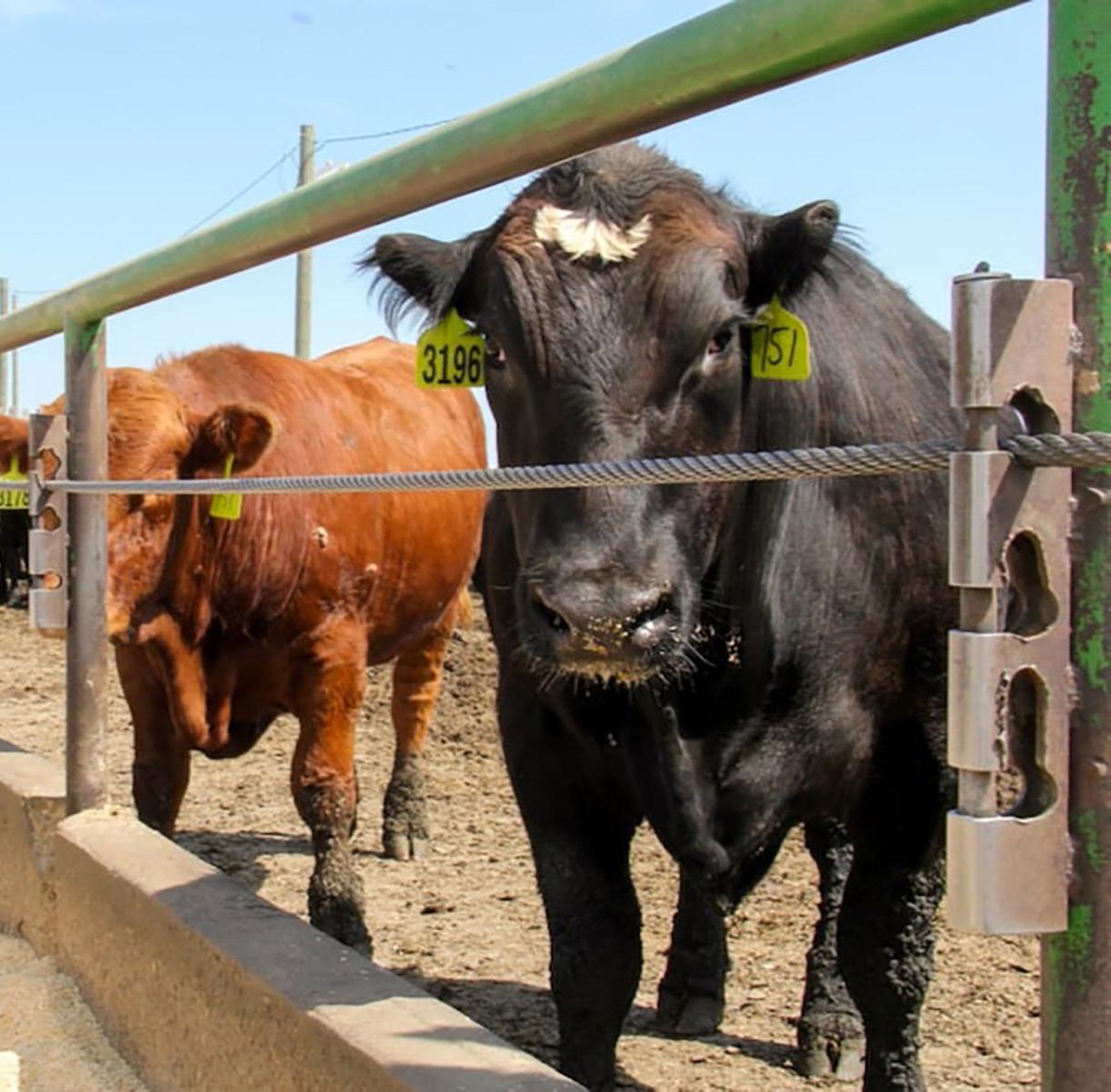
“With this funding, we want to recognize the commitment of Canadian producers in ensuring the viability of this program and their dedication to sustainable practices throughout a difficult production year,” said Eliza Clark, Sustainability Lead, Cargill Protein and Salt. “We are also grateful for the many Cargill customers who have contributed to our combined investment of this initiative. It is their support of programs like the CRSB Certified Sustainable Beef Framework that allows us to create and sustain high standards for sustainability practices across the Canadian beef supply chain.”
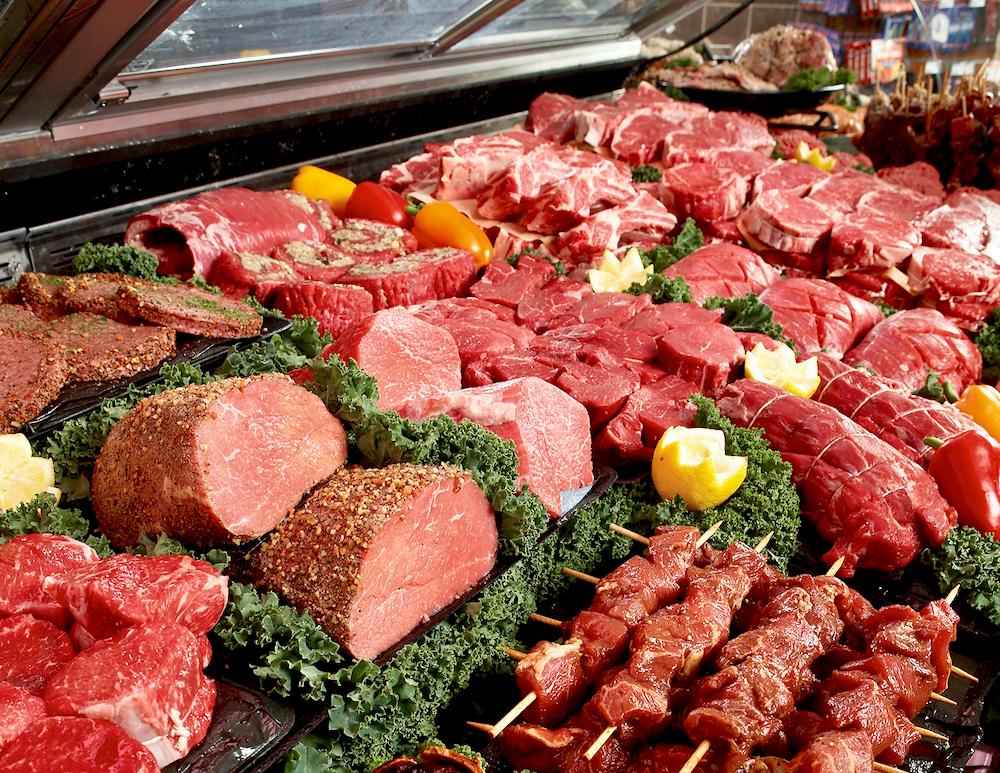
Funding for the CRSB Certification Recognition Credit is provided by Cargill, Centennial Food Solutions, Gordon Food Service, Intercity Packers, MacGregors Meat & Seafood, McDonald’s Canada, Metro, Recipe Unlimited and Walmart.

For more information on this Certification Recognition Credit, visit https://crsb.ca/
For more information on existing Qualifying Cattle Credits, visit https://www.cargill.com/sustainability/ beef/beef-partnership-collaboration
13 meatbusinesspro.com April 2024 MEATBUSINESSPRO


FCC: MODERATE SALES BUT IMPROVED MARGINS FOR CANADIAN FOOD AND BEVERAGE MANUFACTURERS IN 2024
Farm Farm Canada (FCC) recently reported that Canada’s food and beverage manufacturers face a mix of obstacles and optimism for profit margin improvements in the year ahead, according to the latest Food and Beverage Report.
After hitting a record $165 billion in food and beverage manufacturing sales last year, 2024 is expected to see sales moderate in sync with slowing inflation and tighter household budgets.
Despite sector-specific headwinds and changing consumer shopping habits, the overall outlook is more positive. Population growth and stabilizing input costs are two reasons margin improvement is expected in 2024.

“High inflation and interest rate increases over the past two years have put pressure on household budgets, leading to changes in consumer spending habits,” said FCC chief economist, J.P. Gervais in highlighting the evolving consumer landscape. “As a result, Canadians spent less on average on food and beverages in 2023.”

“While changing shopping habits may pose challenges, they also present opportunities for food and beverage manufacturers,” said Gervais. “Taste remains the top consideration for consumers, but price sensitivity has increased, leading processors to innovate and meet evolving consumer demands.”
“FCC Economics is projecting a slight decrease of 1.4 per cent in food and beverage manufacturing sales for 2024. However, we anticipate gross margins to improve by 1.7 per cent on average. One wildcard in our forecasts is the resilience of the U.S. economy, which could lead to growth in exports,” added Gervais.
Many commodity prices have declined which will work their way through the supply chain. These trends are anticipated to continue, boosting margins in 2024.
14 MEATBUSINESSPRO April 2024 meatbusinesspro.com

The report forecasts a decrease in the inflation rate for food purchased at grocery stores, falling below 2.0 per cent this spring and stabilizing around pre-pandemic levels thereafter.
“While challenges persist, 2024 holds promise for Canadian food and beverage manufacturers,” said Gervais. “By adapting to changing consumer preferences and leveraging opportunities presented by population growth, the industry can navigate the year ahead with cautious optimism.”
The annual FCC Food and Beverage Report features insights and analysis on grain and oilseed milling; dairy, meat, sugar, confectionery, bakery and tortilla products; seafood preparation; and fruit, vegetable and specialty foods, as well as soft drinks and alcoholic beverages.

By sharing agriculture economic knowledge and forecasts, FCC provides solid insights and expertise to help those in the business of agriculture and food achieve their goals. For more economic insights and analysis, visit FCC Economics at fcc.ca/Economics. FCC is Canada’s leading agriculture and food lender, dedicated to the industry that feeds the world. FCC employees are committed to the long-standing success of those who produce and process Canadian food by providing flexible financing, AgExpert business management software, information and knowledge. FCC provides a complement of expertise and services designed to support the complex and evolving needs of food businesses. As a financial Crown corporation, FCC is a stable partner that reinvests profits back into the industry and communities it serves. For more information, visit fcc.ca.


15 meatbusinesspro.com April 2024 MEATBUSINESSPRO


NEW U.S. MEAT LABELLING RULES CAUSING CONCERN
New meat labelling rules in the United States could have an impact on the ability of Canadian beef producers to move their product into its largest consumer market.
The changes are part of a decade-long battle between Canada and the U.S. over country-of-origin labelling (COOL).
Right now, ranchers in Canada can raise cattle and ship them to the U.S. for slaughter and still have them labelled as a product of that country.

That will change under the new rules, which were announced last week.
Once they take effect in 2026, only animals born, raised, slaughtered and processed in the United States will be able to sport the “product of USA” or “made in the USA” labels.
Canadian Cattle Association CEO Nathan Phinney says that will hurt producers and consumers on both sides of

“Our concern is the U.S. is 70 per cent of our trading partners. We’ve worked diligently to harmonize our systems, whether it’s our food safety system or growing systems,” Phinney said.
“So, it’s everything that we stand for, and what we work on. Prescriptive measures like this could potentially hinder it or break it down.”
Retailers of the meat will not be required to place any labels on their product, but if they do, those labels will have to follow the more restrictive measures.

16 MEATBUSINESSPRO April 2024 meatbusinesspro.com

Cattle associations in the U.S. continue to lobby for COOL to be mandatory.
many farms here on PEI doing every bit as much as we are as to attain a high level of sustainability. Anyway, we were very surprised when the PEI Cattleman’s Association nominated our farm.
Bill Bullard, president of R-CALF USA, says the current definition allowing Canadian imports to be sold as a local product is deceptive.
CMB: And then you were attending the Canadian Beef conference in Calgary and you won.
DF: Yeah! That was a very nice moment for us. But I don’t like to use the word win actually. However, being recognized for our commitment was a real honour. If you want to know the truth, it was a pretty humbling experience. As I said to CBC when they
“Our system is broken and needs to be fixed, and the way to fix it is to restore competition. The way you restore competition is you empower consumers to make choices in the marketplace,” Bullard said.

Bullard maintains he doesn’t want to see a ban on Canadian imported beef, but simply believes American consumers, when given the choice, will start demanding more of their country’s product.
“And their choices will then send demand signals upstream the supply chain,” Bullard said.
cattle industry. I’m positive you’ll see more farms in our neck of the woods nominated next year. And I have to give the Canadian Cattleman’s Association recognition for choosing a farm from Prince Edward Island. We are small players in the national beef industry and I think it was a real credit to their organization to recognize us. They treated all the nominees royally and it was a real class act. It was a wonderful experience.
“And that will dictate to the multinational meatpackers where they must source the cattle in order to satisfy the consumer demand for beef.” Continued on page 18

https://www.yesgroiup.ca
17 meatbusinesspro.com April 2024 MEATBUSINESSPRO September/October 2017 CANADIAN MEAT BUSINESS 17 meatbusiness.ca

In 2008, R-CALF convinced U.S. lawmakers to institute mandatory country-of-origin labelling.
Almost immediately, U.S. slaughtering facilities started limiting the number of Canadian cattle they would process.
That legislation was repealed after a 2015 World Trade Organization (WTO) ruling said the U.S. violated international law by making COOL mandatory.
By making product labelling voluntary, U.S. legislators have bypassed the WTO ruling, according to Carlo Dade, director of trade and trade infrastructure at the Canada West Foundation.
“It’s not discriminatory if it’s voluntary,” Dade said.
“But it’s like the softwood lumber dispute, I don’t see it going away until they get what they want.”

Dade says American consumers will find beef prices rising if Canadian exports are limited.
For that reason, he believes most retailers and processors of beef will forgo labelling their products with COOL.
“The issue is that the meat production within North America is deeply, deeply integrated. The only way, arguably, we can afford to produce beef at a price that people on the continent can afford is if we have scale and we source and integrate it from all three countries,” Dade said.

“I just don’t see voluntary labelling in a hyper costconscious environment being a worry, unless the Americans can make beef in the U.S. cheaper than they can with inputs from Canada and the integrated system, then we’ve got to worry, but it just doesn’t make any sense. They can’t make it cheaper.”
Alberta’s Agriculture Minister RJ Sigurdson says COOL legislation, even if voluntary, is a move in the wrong direction for Canada-U.S. trade.
He’ll meet with his counterparts from across North America in Octobe and says COOL will be the focus.
“We’re going to continue to work with them to try to make them reconsider this decision,” Sigurdson said.
“It isn’t implemented until January of 2026, so we’re hoping that they will reconsider this decision.”
18 MEATBUSINESSPRO April 2024 meatbusinesspro.com

https://www.cfib.ca



CMC URGES SUPPORT FOR TEMPORARY FOREIGN WORKERS TO REINFORCE CANADA’S MEAT INDUSTRY
In late March, the Minister of Immigration, Refugees and Citizenship, Marc Miller and the Minister of Employment, Workforce Development, Randy Boissonnault announced changes to the Temporary Foreign Worker Program (TFWP), challenging the ability for meat processors to fulfill the needs of Canadian consumers.

The Canadian Meat Council (CMC) issued the following statement to reaction to this announcement.
“Years of successive Agri-food Ministers have acknowledged that our sector is facing a critical labour shortage, The Temporary Foreign Worker Program Workforce Solutions Road Map introduced the timelimited measures in 2022 to address these concerns and provide stability. Through the decision to unilaterally end the temporary measures, this announcement has undermined the certainty we have been working with the government to create – with no notice or consultation.
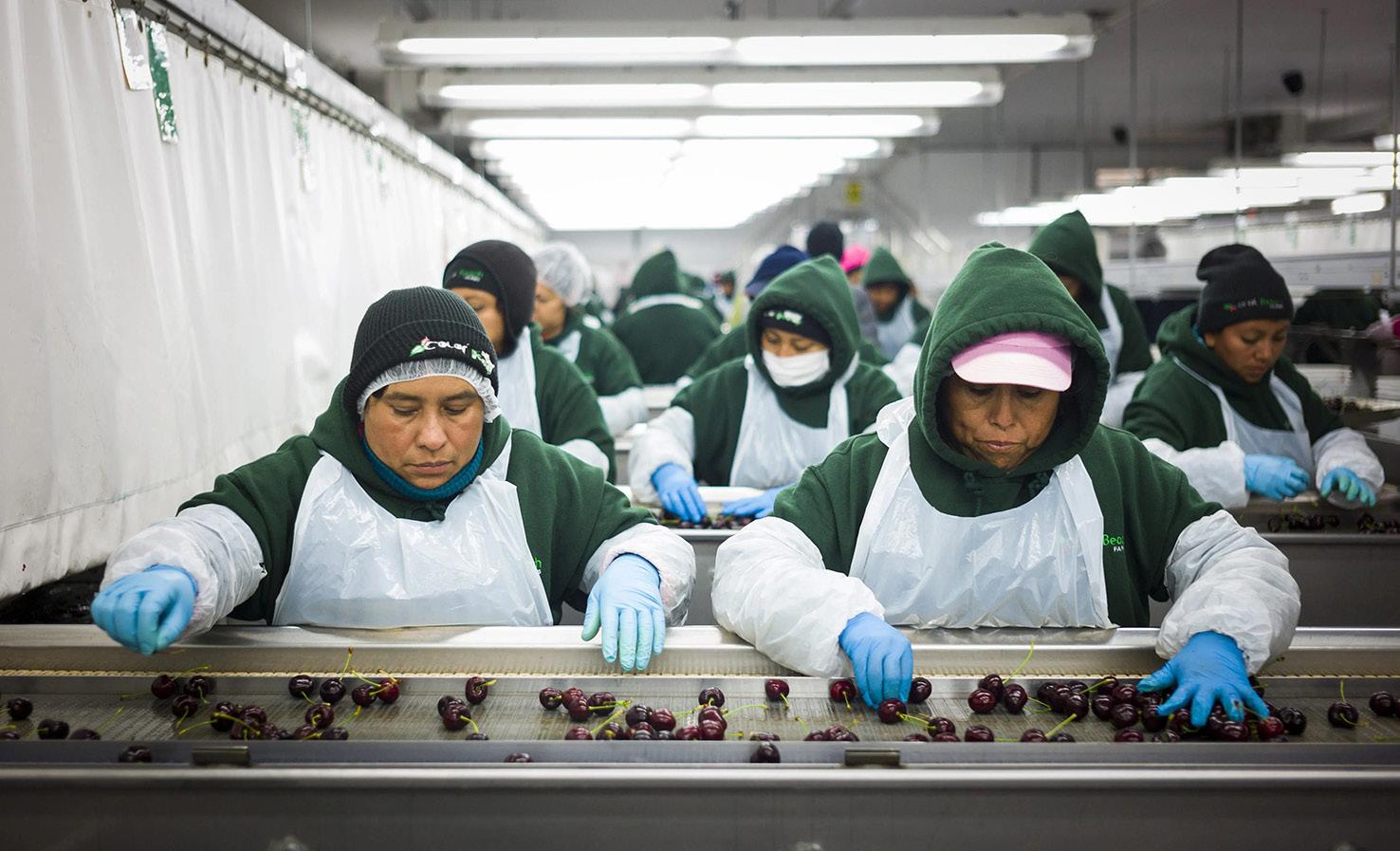
“The Canadian Meat Council is perplexed by the inconsistent logic demonstrated by the hasty and premature reduction of the 30% cap and the direction that our members must abide by these new terms by May 1, 2024. Initially implemented as a solution to the current status of our sector, and promised to run until August 30, 2024, the removal of these measures without meaningful industry consultation will have significant consequences for processors who put food on grocery store shelves.

20 MEATBUSINESSPRO April 2024 meatbusinesspro.com
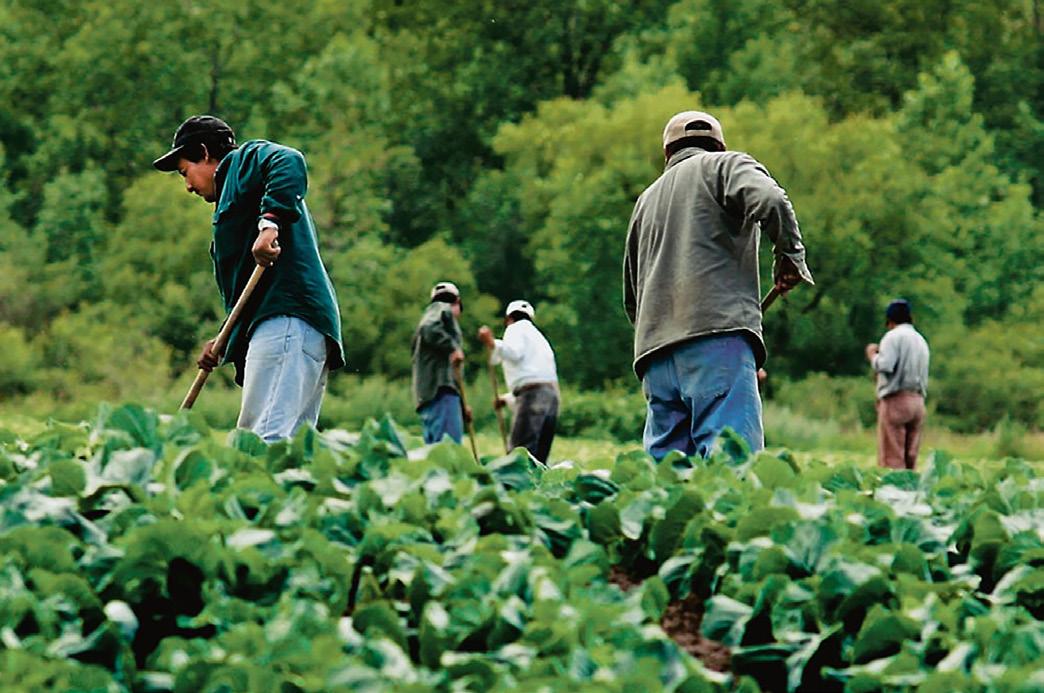
"The simple truth is that skilled workers are essential for meeting the needs of Canadian consumers, and there just aren’t enough Canadian employees to fill the current labour requirements. The loss of skilled workers will only serve to harm our industry and add more pressure to the already-stressed agri-food supply chain.”
NEW SURREY SLAUGHTERHOUSE
“Meat processors are aware that consumers are struggling with food affordability. At a time when our sector is responding to inflation and trade disruptions and labour availability, this is yet another unhelpful policy measure at odds with providing an end-product to consumers at a price-point they can afford,” shared Chris White, Canadian Meat Council’s President & CEO. “Programs like the TFWP Workforce Solutions Road Map not only helped manage mounting labour costs, it provided reassurance to Canadian businesses that they would have a reliable supply of labour – a concern that is increasing, each day.
‘WOULD OPEN DOOR’ TO NEW BEEF MARKETS
Proposed 30,000-square-foot beef abattoir in Cloverdale would be B.C.’s largest such facility
By Amy Reid, Peace Arch News
A federally licensed beef processing facility is in the works in Surrey, BC.
“There’s a new building coming forward, a new abattoir, I think that’s the French pronunciation of slaughterhouse,” said Councillor Mike Starchuk. “So Surrey will have a newer facility with a better capacity so people will have the ability to not have to ship an animal to Alberta to have it processed. The applications have gone through the Agricultural and Food Sustainability Advisory Committee.”
“Make no mistake, the decision to remove these supportive measures is punitive for the agriculture sector, including our meat processors. By ending these measures, we are removing the crucial support that our industry needs to remain competitive, and we are undermining our sector’s ability to meet product supply requirements,” Chris White continued. “We unequivocally refute the notion that employers are unduly reliant on temporary foreign workers.
The facility is proposed on a 25-acre property within the Agricultural Land Reserve at 5175 184th St. The planned 30,000-square foot abattoir in Cloverdale would process up to 100 head of cattle per day.
According to a city report, that would make it larger than any other processing facility in B.C.. But it would still be small by industry standards, compared to the largest meat processing plants in Alberta that process 3,000 heads of cattle per day.
The proposed facility would be fully enclosed and designed

seeking a Canadian Food Inspection Agency license for the proposed abattoir, to become a federally registered meat establishment and expand the operation. This would allow the meat products to be transported beyond B.C.’s boundaries.
“The Canadian Meat Council, on behalf of our members, will continue to work with Government to underscore the importance of reversing the measures announced last week to support our industry as it strives to meet the food security and food affordability needs of Canadian consumers.”
For more information, visit the Canadian Meat Council at https://cmc-cvc.com/
“Our focus is on trying to bring a more efficient, sustainable local product to the market, realizing we can do that now in a very limited sense,” said Les. “I caution people when talking to them and they say, ‘What a big plant, that’s going to go allow you to go mainstream.’ Well, yes, if you look in the context of B.C., but this is still a very niche plant and we’ll serve a niche industry for producers and for the market. It’s certainly not going to be a monstrosity of a plant but it’ll be a big upgrade from the site currently.”

21 meatbusinesspro.com April 2024 MEATBUSINESSPRO
Continued on page 32 https://www.tcextrade.com



NAVIGATING THE IMPACT OF BILL C-58: FROM THE HOUSE OF COMMON'S CORRIDORS
TO
CANADA'S TRADE CORRIDORS
Spring has sprung and farmers are back in the fields; however, in the corridors of the House of Commons, the spotlight is now on Bill C-58. A proposal stirring heated debates, raising significant concerns across various sectors of the economy. This Bill could certainly have an impact on the agricultural sector.

Bill C-58 has passed its second reading and is now at the Standing Committee on Human Resources, Skills and Social Development and the Status of Persons with Disabilities. This bill (C-58) further restricts when replacement workers can be used by federally regulated employers when there is a strike, which includes interprovincial sectors such as trucking, ports, air and rail transportation, grain elevators, and more. To date, we have seen that when major supply chain junctions, such as ports (British Columbia (BC) in 2023 and Montreal in 2020 and 2021) go on strike, it causes large and lasting impacts to the supply chain in Canada.

For example, Maritime Magazine reported that it took 85 days to clear the backlogs and return to normal after the 2020 Port of Montreal strike. The Montreal strike was estimated to cost the Canadian economy between $40 to $100 million per week. Provinces that already have similar legislation in place, such as Quebec and BC, have experienced more strikes. Such policies seem to embolden unions to strike rather than stay at the negotiating table. Thus, there is the likelihood that if this is passed federally, Canada will see more frequent, and longer strikes.
So, Bill C-58 could clearly have serious impacts, but what does this all mean for Agriculture? Farmers are not immune to supply chain issues. I’m sure you would agree, it’s quite the opposite. The supply chain can greatly impact the agricultural industry.
Cattle need feed, meat needs to get to market, crops need fertilizer, and broken machinery needs replacement parts. It’s clear the movement of these inputs and goods are dependent on a well-oiled and operating Canadian transportation infrastructure. Extended delays as a result of strikes compromise these activities or, at the very least, makes them costlier.
22 MEATBUSINESSPRO April 2024 meatbusinesspro.com
1 Maritime Magazine, Port of Montreal raises alarm over suspension in waterfront negotiations, February 17, 2021, online.
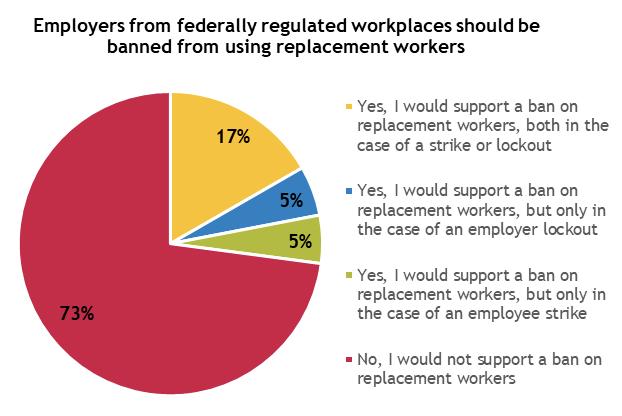
Stoppage – Long Narrative, April 30, 2021, Online Therefore, workplaces that impact our supply chain will always have the possibility of impacting the agriculture industry and with Bill C-58 potentially creating longer and more frequent strikes It will no doubt have negative impacts on Agri-small businesses operations and bottom line.

This is why the CFIB has been calling on the government to ensure that employees who play a critical role in the supply chain are deemed essential workers. Simply because these workers are essential! In fact, when asked, 92% of The Canadian Federation of Independent Businesses (CFIB) members who had an opinion believed that employees from federally regulated workplaces who play critical roles in the supply chain should be deemed as essential workers. Canadian farm and food producers, cannot have a port or rail strike impact their ability to produce and transport food. They help feed Canadians and the world.
The federal government needs to consider how bill C-58 will impact the Canadian economy and make amendments, such as the proposed above, regarding essential workers. CFIB has sent in letters and shared this with Members of Parliament. Hopefully, changes will be made to Bill C-58 to protect Canada’s supply chain and to ensure small-medium enterprises are not impacted by long and frequent strikes.

2 Government of Canada, Port of Montreal Work Annex: Potential Visuals
CFIB, Your Voice Survey, November 10-28, 2022, n= 1,797, final statistics.
Supply chain disruption - our packaging materials come from China via BC. The strike results in delays and increased costs
Agriculture uses many products from abroad and any port delays can and have affected our business in increased costs, production losses and overall moral.
We're in the pork industry. Canada exports pork to Japan and that goes through west coast ports. So........problems!

Alex Oulton is a Policy Analyst for the Canadian Federation of Independent Business (CFIB). CFIB is Canada’s largest association of small and medium-sized businesses with 97,000 members (4,500 agri-business members) across every industry and region. CFIB is dedicated to increasing business owners’ chances of success by driving policy change at all levels of government, providing expert advice and tools, and negotiating exclusive savings. Learn more at cfib.ca.
23 meatbusinesspro.com April 2024 MEATBUSINESSPRO





https://www.yesgroup.ca
201 Don Park Road Unit 1, Markham, Ontario, L3R 1C2 Phone: 905-470-1135 1-800-465-3536 Fax: 905-470-8417
Website: www.yesgroup.ca email: sales@yesgroup.ca
Remco and The Yes Group Protecting
your Customers
Remco products are colour-coded to help divide the production cycle into different zones. By identifying these zones as different cleaning areas, the movement of bacteria around the production area can be blocked.
Our products were developed with the Hazard Analysis Critical Control Point (HACCP) in mind.
No matter what colour-coding plan is implemented, Remco Products from The Yes Group provides significant added value at no additional cost. From scoops to squeegees, from brushes to shovels, we have the products and the colours to enhance any professional quality assurance program.
24 MEATBUSINESSPRO April 2024 meatbusinesspro.com meatbusinesspro.com 31 September/October 2018























































































